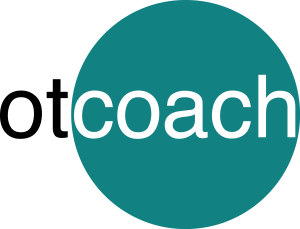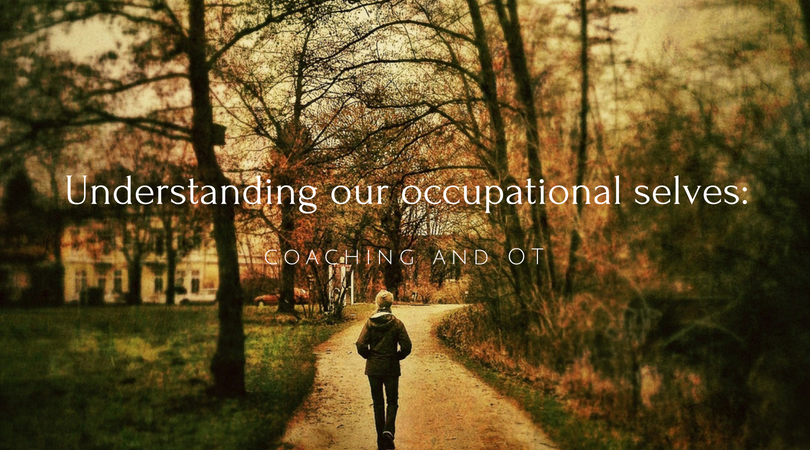I often write about how coaching helps us tackle barriers to occupation, be they lack of confidence or self-belief, the lack of a congruent, desirable action plan or the need to un-earth perhaps unconscious drives/desires which scupper our well-intentioned plans. However, I am often still asked “is this occupational therapy?” or “am I being an OT if I coach?” or “if a client figures it all out through coaching, why do they need me?”
Of course, these are all complex questions and ones which I often reflect on, especially when I teach coaching skills to OTs or after I have been coached myself. People worry that adding coaching to their approach will dilute their OT work, add to their workload or worse undermine the need for the service they are meant to provide lest the client become in charge of their own therapy and not need a therapist*.
For a moment can we loosen our current identity, the one where in mainstream OT, the majority of OTs work with people with nameable/medicalised/diagnosable challenges. Let’s consider a broader perspective of occupational struggles and perhaps desires: a teenager with a difficult home life who drops out of school, the adult with undiagnosed Asperger’s struggling at work, a refugee child in Calais displaced from their home, a middle-class mother who is struggling to manage “modern” western living, a homeless person in a wealthy city, or maybe a business woman who want to improve her performance in the work domain. These “well” individuals could be helped by an occupational therapy approach, couldn’t they? Every person has occupational needs,don’t they?
Consider too that the word therapy, which just means “to change” and change isn’t necessarily prompted by illness, injury or accident is it?. Sometimes deep desires, internal conflict, dissatisfactions or something else prompts us to seek/create occupational change. Human Beings all wake up in the morning wanting and needing to “do stuff” and every human being has unique occupational needs?
The success of the occupational change we seek or try to create will depend on a variety of factors including the power we have/feel we have, how the change fits with those we live/relate, the broader context in which we live and also what our unique occupational profile and needs may be.
To my mind, beyond the action planning, confidence building and supportive functions, coaching within OT helps us understand our personal set of complex life variables and helps us gain great awareness of what our unique occupational needs are.
This is what coaching does for me:
- Being coached reminds me who I am, what I need from my daily activities and what I need to do differently
- Being coached helps me figure out what success means to me and how that is different for everybody
- Being coached helps me recognise the areas of “flow” in my life – the occupations which I value and that give me greatest joy and ease.
- Being coached reminds me of the unassailable fact that I need to create stuff. I value painting (for its own sake) much more highly than having a clean house. Ironing (whatever that is about!) I am quirky and need to do whacky stuff – stuff which I couldn’t really say often results in any tangible outcome.
- Being coached also helps me silence the often rather vocal voice of my “Imposter Syndrome” and soften my perfectionist streak.
- Being coached helps me reconcile my own needs with those of my family, wider society and dog…
- Being coached helps remind me of important plans I made months ago, check out the validity and progress of those plans, amend them and move forward.
- Being coached reminds me what I need to do to keep well, to look after my mental and physical health. It also helps me figure out what I can change, what I can’t and where to best place my efforts.
- Being coached helps me audit my occupational life and work towards greater congruence and joy
If this isn’t an intrinsic part of occupational therapy, then what is? **
It’s difficult being an OT sometimes, isn’t it? We are too frequently asked “what do you do?” or “what difference do you make?”, “OTs do so many different things, I don’t really get it” etc. If you view coaching as something to add to your OT practice or something extra to do or something that confuses our identity further, then I can understand why you question its place in OT. For me, I know that since I learned to coach, I have been a much better OT and my impact has been greater.
*(or the much deeper question “could coaching our service users potentially reduce the need for an OT?” which really should be discussed more, but we will leave that for another day)
**In “Enabling Occupation” CAOT list “Coach” as one of the roles that OTs adopt, alongside Collaborate, Adapt, Educate etc)



4 comments
Fantastic!
The best, most inspirational and empowering thing I have read all week!
I totally agree with you. The quality of my service as an OT has only increased by adding coaching to my toolkit. Thank you for giving us a voice.
I’ve just read this – a year on! This is so helpful and encouraging as I seek to integrate OT and coaching in my career. I’ve been mulling over ‘OT for the masses’ as it is for absolutely everyone at any stage – not just those with a specific medical condition or diagnosis in need of ‘treatment’. I love what you have written. Excited to continue exploring more!
I really enjoyed this article thank you Jen. Many of the themes you write about here strongly resonate with me. A really comforting and inspiring read.